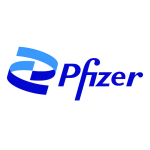Welcome to our dedicated page for Pfizer news (Ticker: PFE), a resource for investors and traders seeking the latest updates and insights on Pfizer stock.
The Pfizer Inc. (NYSE: PFE) news page on Stock Titan aggregates company announcements, clinical data readouts, financial updates and legal developments for one of the world’s major biopharmaceutical manufacturers. Pfizer’s news flow reflects its role in pharmaceutical preparation manufacturing, with frequent updates on prescription medicines, vaccines and late‑stage clinical programs.
Investors and observers can find detailed coverage of oncology trial results, such as Phase 3 data for BRAFTOVI (encorafenib) combinations in BRAF V600E‑mutant metastatic colorectal cancer, PADCEV (enfortumab vedotin) plus pembrolizumab in muscle‑invasive bladder cancer, and TUKYSA (tucatinib) in HER2‑positive metastatic breast cancer. These releases typically report on endpoints like objective response rate, progression‑free survival, event‑free survival and overall survival, along with safety profiles and plans for regulatory discussions.
Pfizer news also includes corporate and financial communications, such as earnings webcasts, performance reports, forward‑year revenue and adjusted EPS guidance, and dividend declarations. Recent releases describe full‑year revenue guidance ranges, expected contributions from COVID‑19 products, the impact of loss of exclusivity for certain medicines, and ongoing cost realignment efforts. Dividend announcements highlight Pfizer’s long record of consecutive quarterly cash dividends.
Another important category is business development and pipeline expansion. News items cover transactions like the acquisition of Metsera, which adds GLP‑1‑based obesity candidates, and an exclusive global collaboration and license agreement with YaoPharma for the small‑molecule GLP‑1 receptor agonist YP05002. These updates explain how Pfizer is building its cardiometabolic and obesity portfolio.
Regulatory, safety and legal topics also appear in the news stream, including multidistrict litigation related to Depo‑Provera and FDA label changes adding brain tumor warnings. By following this page, readers can monitor how scientific, financial and legal events shape Pfizer’s outlook and product portfolio over time.
Pfizer Inc. (NYSE: PFE) will host a webcast on June 16, 2022, featuring Mikael Dolsten, Chief Scientific Officer, at the Storebrand Conference: Invest in the Future. The event starts at 11:40 a.m. CEST (5:40 a.m. EDT). Investors can access the live presentation and register through www.pfizer.com/investors. A transcript and replay will be available within 24 hours post-event for 90 days. Pfizer emphasizes its commitment to health advancements and innovation, impacting global healthcare.
Pfizer Inc. (NYSE: PFE) is hosting a webcast discussion with Chief Scientific Officer Mikael Dolsten and Chief Development Officer William Pao at the Goldman Sachs 43rd Annual Global Healthcare Conference on June 15, 2022, at 8:40 a.m. PDT. Interested parties can access the webcast at www.pfizer.com/investors. The transcript will be available within 24 hours and accessible for at least 90 days. Pfizer focuses on innovative therapies and vaccines to enhance patient lives and actively engages in global health initiatives.
Pfizer Inc. (NYSE: PFE) announced a $120 million investment to expand its manufacturing capabilities at the
Pfizer Inc. (NYSE:PFE) announced overall survival results from the Phase 3 PALOMA-2 trial evaluating IBRANCE® (palbociclib) with letrozole in first-line treatment for postmenopausal women with HR+, HER2- metastatic breast cancer. With a median follow-up of 90 months, the study showed a median overall survival of 53.9 months for the treatment group versus 51.2 months for the control, though the results were not statistically significant (HR=0.956). The trial's primary endpoint was progression-free survival, previously met in 2016.
Pfizer announced plans to exit its 32% ownership interest in Haleon, the new standalone company formed post-GSK demerger. This move aims to maximize shareholder value. The demerger, involving GSK transferring approximately 80% of its consumer healthcare business to GSK shareholders, will be completed by July 2022. Haleon will also pursue a listing on the New York Stock Exchange. Key legal and financial advisors, including Morgan Stanley and Guggenheim Securities, are engaged in the process. This strategic decision aligns with Pfizer's focus on innovative medicines and vaccines.
Pfizer Inc. (NYSE: PFE) will host a live webcast on
Pfizer (NYSE: PFE) announced that its investigational therapy ervogastat (PF-06865571) and clesacostat (PF-05221304) for treating non-alcoholic steatohepatitis (NASH) with liver fibrosis has received Fast Track designation from the FDA. This designation aims to expedite the review of therapies addressing unmet medical needs. Phase 2a trial results showed a significant reduction in liver fat and a favorable safety profile. Pfizer is also conducting an ongoing Phase 2 trial (NCT04321031), with results expected in 2024, which will inform potential Phase 3 development.
Pfizer Inc. (NYSE: PFE) will host a webcast featuring CEO Albert Bourla at the Bernstein 38th Annual Strategic Decisions Conference on Wednesday, June 1, 2022, at 9:00 a.m. EDT. Interested parties can access the live event and subsequent replay on Pfizer's investor website, available at www.pfizer.com/investors, starting today. A transcript and replay will be accessible for 90 days following the event. Pfizer emphasizes its commitment to improving patient health through innovative therapies and ongoing support for affordable healthcare worldwide.
Pfizer has launched 'An Accord for a Healthier World', aiming to provide patent-protected medicines and vaccines on a not-for-profit basis to 1.2 billion people in 45 lower-income countries. This initiative includes partnerships with five initial countries: Rwanda, Ghana, Malawi, Senegal, and Uganda. Key objectives include improving healthcare infrastructure and access to essential medicines to reduce health inequities. Pfizer will offer 23 medicines and vaccines, with future products added to the Accord as they become available.
Pfizer announces the launch of ‘An Accord for a Healthier World’, providing its patented medicines and vaccines on a not-for-profit basis to 1.2 billion people across 45 lower-income countries. The initiative aims to address health inequities and includes collaboration with health officials from Rwanda, Ghana, Malawi, Senegal, and Uganda. Pfizer commits to making available 23 medicines and vaccines and streamlining regulatory pathways to improve access. The Accord emphasizes global health equity, with potential impacts on the lives of nearly one million annually in these regions.

